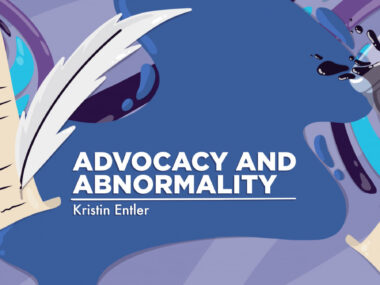How personifying cystic fibrosis made me a monster slayer
This time-honored tradition can be a helpful way to cope with chronic illness
Written by |

Mom raised me to be a hungry reader, so it wasn’t long until I explored one of her favorite genres, Southern Gothic. Tales from this corner of the library are identified by distorted realities, eerie supernaturalism, eccentric characters, and sometimes abrupt violence.
These elements are often bound together to critique real-world imbalances like classism, racism, and violence. It’s common for the characters to serve as problems personified, evil given arms and legs, so the author can weave a tale of vengeance executed against that problem. It’s cathartic to imagine the problem as defeatable.
Mom also introduced me to poetry by people of color and other oppressed groups that processed traumas like slavery and colonialism. Bear with me. I’m going somewhere with all of this.
She recently showed me a poem titled “I Give You Back,” by the first Native American U.S. poet laureate, Joy Harjo. In it, Harjo anthropomorphizes (treats a nonhuman thing like it’s human) the fear she felt as an Indigenous woman and then gives it a piece of her mind. The poem gives fear a personhood so she can divorce that person. Whereas she once thought the fear to be inseparable from her self, she now sees the fear as someone toxic to be cast away.
In an interview with Robert Casper, of the Library of Congress Blogs, a few years ago, Harjo mentions the Mvskoke tradition of writing words that transform and weaken the power of what’s harmful. I realize now that tradition can be found in many places, from the Hebrew exile psalms and their influence on American slavery laments, to Southern Gothic. To end the interview, Harjo says, “We will survive with poetry.”
Despite the trials of cystic fibrosis, Mom pulled me through to today with weeping prayers, fierce advocacy, and by making terribly difficult choices I didn’t have the wisdom to receive gratefully. She also delivered me to today by teaching me the empowerment of the written word. When I began pulling Southern Gothic and African American poetry anthologies from our living room bookshelf, without realizing it, I had adopted the Mvskoke tradition.
The hijacker
Medical trauma is particularly complex because society typically thinks of trauma in terms of persons who have hurt us. Though individuals have hurt me, the villain of my story is a faceless disease. But because it’s hard-wired into my genetic makeup, it’s a disease that is me, which produces self-loathing. And because the disease is an it rather than a he or she, I can’t dialogue with it.
But let me tinker with this perspective. What if, instead, our genetics are hijacked by this cowardly abuser?
See what I did there? My disease is an abuser, and one who has a weakness: He’s afraid. Afraid I might marshal all resources against him, afraid I’ll grow stronger than him. And the disease is not really me, but a hijacker.
Suddenly, my disease is a character who’s outside my own identity and can be defeated. Like Harjo, I divorce myself from my enemy so that I no longer loathe myself; I can instead focus on defeating that other. I’m no longer tempted to downplay its terribleness with toxic positivity because, man, that character just sucks so bad.
Through my inherited traditions, I’ve countless times imagined a confrontation with that character. This has helped me survive. I’ve written Southern Gothic-inspired fiction that helped me process the absurdity of this disease and then avenge myself. I’ve written tear-stained letters to my disease, lamenting how much he’s hurt me. I’ve written ugly poems and blog posts describing how transplant surgeons conquered my abuser, ripped him to smithereens.
I sound violent and absurd. But I don’t know how else to frame it so that I feel like I’ve had victories in this long fight. I’ve needed someone to beat, someone to defy. In my youth, I projected my hurt onto other people, but I finally matured enough to instead creatively direct my rage at my disease. I’d rather sound absurd than be hateful toward my community.
It turns out I’m not so alone in using this strategy to deal with chronic conditions. One person wrote about her mother personifying multiple sclerosis to help her cope. Another wrote of personifying her brother’s mental illness, and another of personifying her son’s obsessive-compulsive disorder.
Why not try this yourself? You don’t have to be a particularly skilled writer or poet. Instead, try writing a letter to your disease and see what comes of it. But note with importance that in the writing traditions I mentioned, and in therapists’ use of what they call “illness personification,” the goal is not to make an invincible monster of the disease and a helpless victim of yourself. The goal is to make it a monster that can be slayed, and yourself the monster slayer.
Write about living long enough for a cure. Write to grow empowered against the disease. Write victoriously, with the courage you very much wish you had. “We will survive with poetry.”
Note: Cystic Fibrosis News Today is strictly a news and information website about the disease. It does not provide medical advice, diagnosis, or treatment. This content is not intended to be a substitute for professional medical advice, diagnosis, or treatment. Always seek the advice of your physician or other qualified health provider with any questions you may have regarding a medical condition. Never disregard professional medical advice or delay in seeking it because of something you have read on this website. The opinions expressed in this column are not those of Cystic Fibrosis News Today, or its parent company, Bionews, and are intended to spark discussion about issues pertaining to cystic fibrosis.








Leave a comment
Fill in the required fields to post. Your email address will not be published.